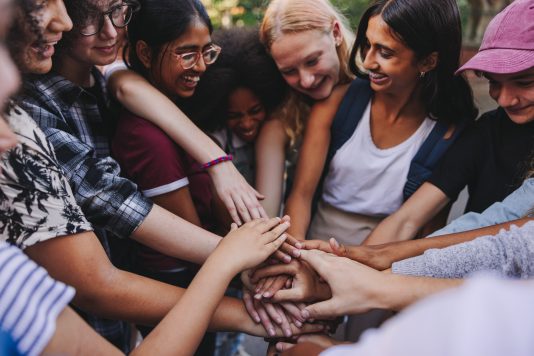


“Dialogue and discussion, always and immediately. When all is said and done, dialogue and discussion allow—better than authority and discipline, better than punishments and rewards—children to socialize and develop the self-discipline and self-esteem I’ve just mentioned.”
– Michel Fize, Antimanuel de l’adolescence
Dialogue, a fundamental pillar of human communication, plays an essential role in teens’ personal development. According to psychoeducator Vickie Bois, teens learn, through their relationships with others, to assert their needs, to get to know themselves, to develop their self-esteem and skills and to invest in positively reciprocal relationships.
However, for young people from disadvantaged backgrounds, the process of dialogue can be hindered by different challenges linked to their socio-economic status, as well as psychological and familial problems.
Here are some explanations to help us understand why young people from precarious backgrounds can have difficulty communicating, what impact this has on them and how travel can help them forge rich and authentic social relationships, all while improving their ability to communicate in a healthy manner.
Why do teens from disadvantaged backgrounds find it harder to engage in dialogue than their more affluent peers?
While adolescence is an age when social interactions play an essential role, several factors can explain why teens from precarious backgrounds are generally less adept at engaging in dialogue.
According to Vickie Bois, the family is the first place where young people socialize. Family situations, including the parents’ level of education and style of communication at home, strongly impact the development of social skills. Young people who are not exposed to an environment of welcoming communication can, as a result, have trouble expressing themselves in a clear and developed manner.
In fact, Vickie Bois suggests that speech development and expressive skills are formed through regular stimulation and prolonged exposure to a harmonious environment where healthy communication is present.

In this way, socio-economic difficulties (financial instability, trouble accessing accommodation and food, jobs that don’t make you feel valued, discrimination, etc.) can make parents in a disadvantaged environment feel severely stressed, negatively impacting the quality of their discussions with their families. They’re more focused on their day-to-day survival than on research about constructive verbal discussions and solutions.
Furthermore, families from disadvantaged backgrounds are more likely to be subjected to psychological difficulties, addictions and family disputes, and we observe a greater presence of violence in their interactions. For a child, the fear aroused by violence can lead them to be more wary of others and believe that social interactions should be based on power dynamics.
Without positive role models, teens from precarious backgrounds may find it harder to adopt constructive and respectful behaviours, hindering their functioning and relationships. Social skills require a variety of skills: self-esteem, a sense of self-efficacy, empathy and interpersonal problem solving.

These communication difficulties can sometimes be worsened by coercive or negligent parental practices. It has been shown that 62% of children flagged for negligence come from disadvantaged backgrounds. Negligence can lead to shortcomings in learning self-control and several social skills, as well as low intellectual stimulation.
On the flip side, an overly authoritarian upbringing can inhibit young people’s self-esteem, limiting their ability to express their needs and emotions. According to Vickie Bois, this lack of a safe space to express oneself leads to withdrawal, behavioural inhibition and anxiety. This bottling up can engender wariness toward authority, thereby hindering emotional expression, identity forming and relationship skills.
The difficulties faced by young people in accessing education and culture also represent a major obstacle. By having less exposure than others to a variety of ideas and points of view, these young people may have more difficulty developing a rich vocabulary and critical thinking skills, and can feel less confident or prepared to take part in in-depth discussions.
This feeling is worsened when their precarious living conditions drive them to develop coping mechanisms such as reticence, mistrust or even emotional unavailability to deal with their challenges, which can further aggravate their troubles engaging in dialogue.
All these problems cause them to view themselves in a negative light, which can impede their desire to express themselves or actively take part in discussions out of a fear of being judged or stigmatized. This phenomenon is all the more pronounced when teens are up against a language barrier.
How can travel help teens from precarious backgrounds develop their communication skills?
“Nothing develops intelligence like travel.” – Émile Zola
Far from their home environment that might not lend itself well to communication, travel can provide a neutral space that enables teens to open up to others.
Through the different discoveries that travel offers them (new cultures, visits to natural sites, etc.), young people get the opportunity to acquire a broader vision of the world thanks to the different realities they’re exposed to.
According to Vickie Bois, these experiences pique their curiosity, encouraging dialogue between teens and their peers or adults in their lives, and help develop their shared interests and tastes.
Through this experience, young people develop stronger and more authentic connections with other teens and their teachers, and tend to communicate in a more constructive and respectful manner.
According to the “Hors les murs” initiative, led by a team of psychoeducators (including Vickie Bois) and the CISSS de la Montérégie-Ouest, which follows young people between the ages of 14 and 17 experiencing psychological difficulties, 50% of young people displayed fewer problems with authority and their relationships with adults were more fulfilling (54%) as a result of their trip.
What’s more, organizing a trip to a youth hostel encourages teens to collaborate and interact with one another. As a result, teens learn to express their point of view in a more constructive manner, improving their communication skills and their ability to manage their emotions.

By actively participating in their travel plans, making decisions and overcoming associated challenges, the teens also learn to assert themselves, become more aware of their agency and become more open to communication.
All this helps teens view themselves in a more positive light, as proven by the “Hors les murs” project, in which 88% of young people improved their self-esteem score after their trip. Being involved in the planning process from beginning to end allowed them to feel truly successful.
By leading a travel project within the framework of school, all while avoiding the traditional system of rewards and punishments, young people may feel liberated from adult pressure and feel more inclined to get involved in their class group. This increased engagement with their classmates makes it easier for young people to express their opinions and aspirations, all while enabling them to feel more in touch with their school environment.
Fundamentally, travelling constitutes a unique opportunity to create positive shared memories with other teens. These experiences become reference points, reinforcing emotional connection in class and laying the foundations for long-lasting dialogue, all while inspiring hope for a better future.
According to Vickie Bois: “Such a positive travel experience not only allows young people from disadvantaged backgrounds to develop their social skills, but also broadens their horizons, making for healthier and more stable future relationships. It’s a journey through themselves in which they can choose to adjust their sails and thus change the course of their stormy childhood path.”
